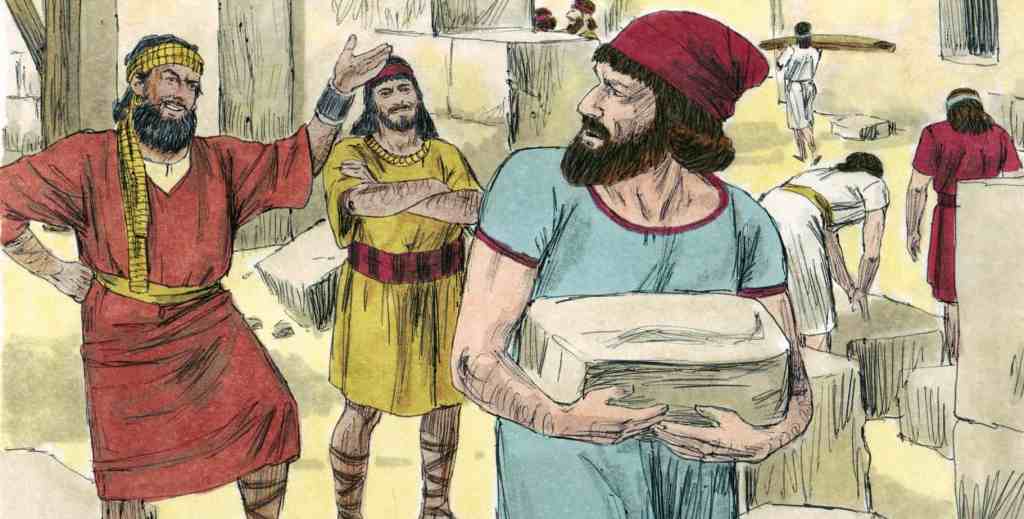
A Metaphorical Walk Through Ezra and Nehemiah
What Does the Rebuilding of the Temple Tell Us About Our Spiritual Walk?
The destruction of Jerusalem by the Babylonian army under Nebuchadnezzar in 606 B.C. left the nation in shambles. The Judahites and Benjamites were transported to regions of the Babylonian Empire along the Euphrates River, primarily along the rivers (actually canals) Chebar, Casiphia, and Ava (Ezekiel 1:3; Ezra 8:15-17), due to the grave disobedience of these people in worshipping idols, adultery, polluting the Sabbath Day, and in general forsaking the laws of God in favor of following the sins and abominations of the Canaanite nations around them. In fact, Judah was accused of sinning even more than its neighbor to the north — Israel, whose sins had thrust it into captivity by the hands of Shalmaneser, the king of Assyria. The Judahites simply refused to learn from Israel, and were thus doomed to repeat Israel’s destiny.
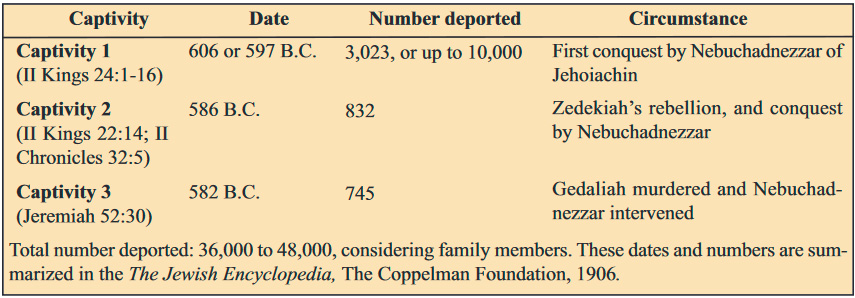
Yet, not all was lost. The Eternal had a plan to restore the nation to at least a small degree by having a remnant of Judah return to their Palestinian homeland 70 years after their first captivity There actually were three captivities, the dates of which are somewhat in question.
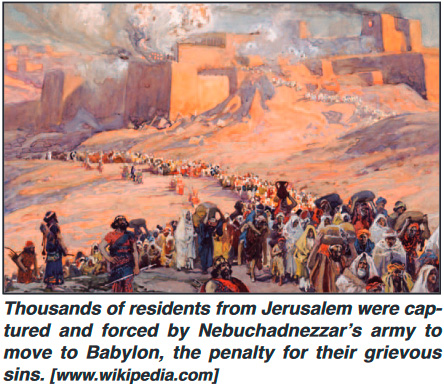 The Babylonians did not treat the Israelite captives with undo harshness — even though their terrible dejection at being captured and transported away from their homeland hung heavily upon their shoulders. The first exiles expected to return speedily to their homes, a hope that was quashed once they learned that Jerusalem was destroyed in 586 B.C. They settled in, at Jeremiah’s pleading, for a protracted exile (Jeremiah 29:4-9).
The Babylonians did not treat the Israelite captives with undo harshness — even though their terrible dejection at being captured and transported away from their homeland hung heavily upon their shoulders. The first exiles expected to return speedily to their homes, a hope that was quashed once they learned that Jerusalem was destroyed in 586 B.C. They settled in, at Jeremiah’s pleading, for a protracted exile (Jeremiah 29:4-9).
Conditions for the Israelite exiles were undoubtedly much better than for the people who remained in Judea. About 13 to 35% of the population was transported out of Judea, while the remainder stayed to work at least part of the land (Jeremiah 52:16); other people were brought in to replace the dispossed population, as had Assyria brought in peoples from Babylon, Cuthah, Ava, Hamath, and Sepharvaim (II Kings 17:24) to inhabit parts of Israel after that nation was taken into captivity; they were known as Samaritans, whom Jesus met on occasion during His walks to the north (Luke 9:52; 10:33; 17:16; John 4:9, 39).
By the canals Chebar, Casiphia, and Ahava the Judahites preserved their old tribal distinction and kept genealogical records (Ezra 8:17; Ezekiel 13:9), and the heads of the tribes or elders were the leaders of the several communities (Ezra 8:1-16; Ezekiel 8:1; 14:1). The people worked the soil, raised families, and through thrift and diligence accumulated wealth. Moreover, these Judahite exiles were allowed to exercise their closely held religious practices and other internal affairs; they were not forced to accept the religion of their conquerors. Claims by the prophets of misery, imprisonment; ill-treatment, and abuse by the Babylonians related to the pangs of having lost their homeland and having to live in the shadow of a pagan captor (Isaiah 12:14; 42:20-24). As The Jewish Encyclopedia points out,
“The prophets also deplore the deep humiliation to which God has subjected His people by consigning them to ruin, and they bewail the circumstances that even the religious leaders, the priests and the Prophets themselves, have been delivered up to the profanation of a pagan people, instead of being permitted to serve the Lord in His holy temple according to the divine mission appointed to them (Isaiah 43:28; 47:6). The source of the most poignant grief on the part of the pious devotees of Yhwh was the ridicule cast by the idolaters upon their religion, their God, and His power, for, as the pagans could not trace the downfall of the people to its true cause — the sins of the people themselves — they beheld in the fall of Jerusalem and its temple a proof of the weakness of Israel’s God (Isaiah 52:3).”
The Judahite exiles were able to practice circumcision, the Sabbath and Holy Days, prayer, and fasting, although the animal sacrifices to honor God were not possible to keep. As Ezekiel wrote, individual morality and law-keeping was emphasized, in juxtaposition to the worship of pagan idols and the attendant immoral behavior of the Babylonian religion (Ezekiel 18:10-32; 36:26; Deuteronomy 24:16; Numbers 26:11). It is presumed that the Judahites understood that their captive condition had resulted from sins and transgression of God’s laws, especially idol-worship. This was the same downfall as had struck the northern tribes of Israel, with the setting up of the calf idols, changing the priesthood, and even altering the Feast days (I Kings 12:28-32; II Chronicles 11:15). These Judahite captives were convicted that they must avoid a repeat of these sins or receive even harsher punishment.
The Return After 70 Years
The Persian King Cyrus overcame the Babylonian empire at the Battle of Opis in 539 B.C. Thereupon Babylon was incorporated into the Persian realm. Cyrus vowed to respect the Babylonian people and allowed captured people to return to their homelands; this included the captives from Judah.
Finally, after 70 years in exile, a contingent of Judahites assembled at the canel Ahava … those who desired to return to Judea. This included 1,800 men (about 6,000 family member; Ezra 8) plus 38 Levites and 220 slaves of the Temple from Casiphia. With the backing of a proclamation from the Persian king Cyrus, this contingent trekked back to Palestine in 536 B.C. to set up new communities in their original homeland. Only a small portion of the 125,000 to 130,000 estimated Judahites in Babylon left for Palestine. Many chose to stay put, having amalgamated into Babylonian culture and having lost the vision of forging a new life in their homeland.
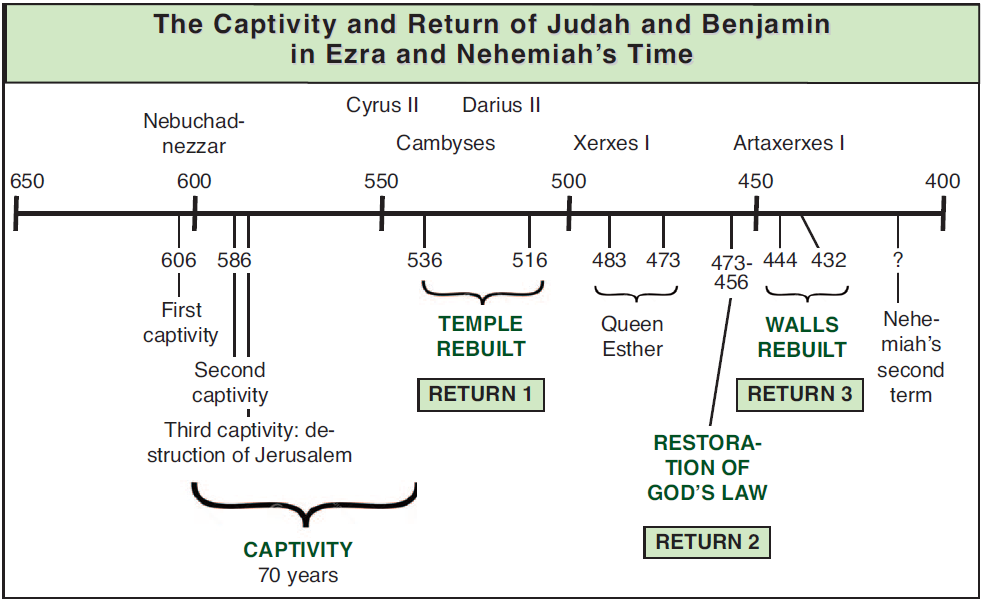
The return was very difficult, facing all sorts of resistance from inhabitants of the land. Yet, the people persisted, and through these trials, over many years, gained the victory. They first built the temple under the leadership of Zerubbabel, from 536 to 516 B.C. (Ezra 1-6). Fifty-seven years later Ezra restored the spiritual
underpinnings of the nation, in 458 to 456 B.C. (Ezra 7-10), and after a 12-year lapse Nehemiah journied to Jerusalem to initiate the building of the city’s wall. These periods constitute the first, second, and third returns of the Judahite exiles to Jerusalem; see the timeline in the figure above.
The Lessons for Us
These events for ancient Judah and Benjamin have a lot to say about our own spiritual journey. The sins of a people bring them eventually into captivity, as Leviticus 26 and Deuteronomy 28 clearly point out, a reality that the captives from Judah came to understand during their captivity in Babylon. We likewise were captives to sin in our former lives, before we repented of our sins, were baptized, and became new creatures (II Corinthians 5:17; Galatians 6:15).
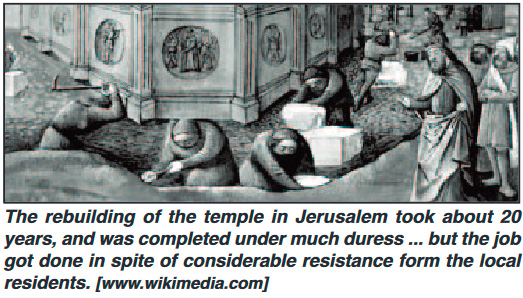 “His own iniquities entrap the wicked man, and he is caught in the cords of his sin. He shall die for lack of instruction, and in the greatness of his folly he shall go astray” (Proverbs 5:22-23).
“His own iniquities entrap the wicked man, and he is caught in the cords of his sin. He shall die for lack of instruction, and in the greatness of his folly he shall go astray” (Proverbs 5:22-23).
“The spirit of the Lord God is upon Me, because the Lord has anointed Me to preach good tidings to the poor. He has sent Me to heal the brokenhearted, to proclaim liberty to the captives, the opening of the prison to those who are bound” (Isaiah 61:1; Luke 4:18).
“I speak in human terms because of the weakness of your flesh. For just as you presented your members as slaves of uncleanness, and of lawlessness leading to more lawlessness, so now present your members as slaves of righteousness for holiness. For when you were slaves of sin, you were free in regard to righteousness” (Romans 6:19-20).
[See also James 1:14-15; John 8:34; Acts 8:23; II Timothy 2:26; II Peter 2:19; Galatians 5:1.]
I have selected seven metaphorical lessons that the books of Ezra and Nehemiah teach us as the elect of God. They are as profound as they are instructive to us, based upon the truth that we are the temple of God, the place where He dwells (I Corinthians 3:9, 16; 6:19; II Corinthians 6:16; Ephesians 2:10, 20-22; Hebrews 3:6; I Peter 2:5-7; II Timothy 2:20-21).
- We help build one another’s temple.
Nehemiah 4:16-17. “So it was, from that time on, that half of my servants worked at construction, while the other half held the spears, the shields, the bows, and wore armor; and the leaders were behind all the house of Judah. Those who built on the wall, and those who carried burdens, loaded themselves so that with one hand they worked at construction, and with the other held a weapon.”
 Us. We, in our bodies of flesh which contain the holy spirit, are temples of the loving God (I Corinthians 3:16-17; 6:19; II Corinthians 6:16). We must serve one another while each of us builds his temple and its protective wall. We help build one another’s temple and wall in specific and highly effective ways; we watch out for and guard each other, for it is within our personal temples that God dwells (Psalm 18:6; 48:9; Ezekiel 1:26-27; Micah 1:2; Revelation 4:2-3).
Us. We, in our bodies of flesh which contain the holy spirit, are temples of the loving God (I Corinthians 3:16-17; 6:19; II Corinthians 6:16). We must serve one another while each of us builds his temple and its protective wall. We help build one another’s temple and wall in specific and highly effective ways; we watch out for and guard each other, for it is within our personal temples that God dwells (Psalm 18:6; 48:9; Ezekiel 1:26-27; Micah 1:2; Revelation 4:2-3).
- We wash each other’s feet by serving one another (John 13:1-17).
- We serve one another with our spiritual gifts (Romans 12:4-13; I Corinthians 12; Ephesians 4:11-12; I Peter 4:10).
- We provide for the needs of our brethren (Matthew 25:31-40; Romans 12:13; Galatians 6:2).
- We look upon other brethren as better than ourselves (Romans 12:10, 16; Ephesians 5:21; Philippians 2:3, I Peter 5:5).
- We empathize with others (Romans 12:15).
- We love one another (Romans 13:8-10; I Corinthians 13).
- We support the weak (Romans 15:1; Galatians 6:1; I Thesalonians 5:14).
- We resist all efforts of Satan and people in the world to cease building our temple.
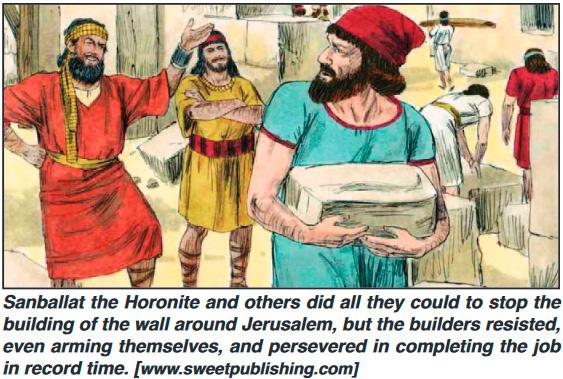 Ezra 4:6-24; 5:1-17; 6”1-15; Nehemiah 4:1-23; 5:1-19; 6:1-19; 7:1. Enemies of the Judahites wrote to King Artaxerxes to cause the cessation of building the temple in Jerusalem, and the king consented. However, the Judahites began building again during the reign of Darius, and the temple was completed in Adar in the sixth year of Darius’ reign. Likewise, the rebuilding of the walls experienced much resistance from Sanballat the Horonite, Tobiah the Ammonite, and others. Then half of the builders armed themselves while the others built, and after 12 years during Nehemiah’s time the wall was completed.
Ezra 4:6-24; 5:1-17; 6”1-15; Nehemiah 4:1-23; 5:1-19; 6:1-19; 7:1. Enemies of the Judahites wrote to King Artaxerxes to cause the cessation of building the temple in Jerusalem, and the king consented. However, the Judahites began building again during the reign of Darius, and the temple was completed in Adar in the sixth year of Darius’ reign. Likewise, the rebuilding of the walls experienced much resistance from Sanballat the Horonite, Tobiah the Ammonite, and others. Then half of the builders armed themselves while the others built, and after 12 years during Nehemiah’s time the wall was completed.
Us. We must resist the world and Satan in the world, just as the Judahites did the gentile residents of Judea when they built the temple and the walls. We combat evil with every tool available for us as we build our temple.
- We resist Satan the Devil through our will to serve the Creator (James 4:7-8; I Peter 5:6-9; Ephesians 4:27; 6:11-12).
- We must put on the whole armor of God to be able to stand against the wiles of the Devil (Ephesians 6:11-17).
- We must move forward in life with power, love, and every other fruit of God’ spirit (Nehemiah 4:13-23; II Timothy 1:7).
- We do not let fear rule over us (Genesis 15:1; Exodus 20:20; Deuteronomy 1:21; 20:3; Joshua 10:25; Isaiah 41:13; Luke 12:7; there are 63 verses that say “fear not” in the King James Version)
- We move forward in life, not dwelling on the past (Philippians 3:13-14; Hebrews 6:1).
- We pray and petition God to help us through every trying moment of our lives to be victors over Satan and sin (James 5:16; II Kings 20:1-7; Psalm 34:15; 145:18-19; John 9:31; I John 3:22).
We receive decrees from God — the mighty King — as the Judahites did from Cyrus, Darius, and other kings, decrees like: “And I saw thrones, and they that sat on them, and judgement was committed to them. then I saw the souls of those who had been beheaded for their witness to Jesus and for the word of God, who had not worshipped the beast or his image, and had not received his mark in their foreheads or on their hands. And they lived and reigned with Christ for a thousand years” (Revelation 20:4).
- We fear God and keep His commandments.
Ezra 4:23-24; 6:14-15; Nehemiah 6:15. A letter from King Artaxerxes, written at the behest of the adversaries of the Judahites in their effort to rebuild the temple at Jerusalem, required the building to cease. Then, some time later, King Darius wrote a letter to resume the building of the temple and it was completed during the sixth year of Darius. The wall was completed in 52 days, after King Artaxerxes had sent letters to the governor of the area, through much resistance from the local people as had been for the temple rebuilding. The building of the temple and walls was eventually completed, but not without many lapses in the Judahites’ efforts.
Us. Like the Judahites followed the kings’ edicts to build the temple and its walls — the proverbial “city of God”— we are commanded by our Creator to keep His laws, commandments, statutes, and judgments, even as Abraham did (Genesis 26:5), and as the prophets and patriarchs did throughout history. Keeping those laws, as Christ showed us in the spirit, builds the very character of our Father and Christ in us, and grants untold blessings in our lives.
“If you walk in My statutes and keep My commandments, and perform them, then I will give you rain in its season, the land shall yield its produce, and the trees of the field shall yield their fruit. Your threshing shall last till the time of vintage, and the vintage shall last till the time of sowing; you shall eat your bread to the full, and dwell in your land safely…. I will set My tabernacle among you, and My soul shall not abhor you. I will walk among you and be your God, and you shall be My people.” (Leviticus 26:3-5, 11-12; see also Deuteronomy 6:25; 28:1-14; Joshua 22:5; Psalm 119:97, 113, 163, 165, 172; Matthew 19:16-19; I John 3:4; 5:3).
We too have lapses in our efforts to build the temple of the living God within us, like the Judahites did when they were rebuilding Jerusalem, but we keep moving forward through the suffering and pain of living within a world perverted by Satan (Philippians 3:13-14; II Corinthian 4:4; Ephesians 2:2). Note the following words:
“For a righteous man may fall seven times and rise again, but the wicked shall fall by calamity” (Proverbs 24:16).
“The steps of a good man are ordered by the Lord, and He delights in his way. Though he fall, he shall not be utterly cast down; for the Lord upholds him with His hand” (Psalm 37:23-24).
“The Lord upholds all who fall, and raises up all who are bowed down” (Psalm 145:14).
Like the Judahites who lapsed in building the temple and walls of Jerusalem through the pressure of adversaries, they persisted in their efforts, and after many days and years succeeded in completing their building. So do we persist in building our own temple though harassed by countless trials; note Paul’s incredible trials in II Corinthians 11:23-28. Though harshly tried, his response in verse 28 was his “… deep concern for all the churches.” His concern was for the faithful elect, his selfless desire to serve and build up the brethren, trusting that no calamity would fall upon him which the Eternal would not deliver him from (I Corinthians 10:13).
- We go where the Eternal sends us.
Ezra 2; Nehemiah 7:6-72. Thousands of Judahites who had been moved into captivity to Babylon were inspired to return to Judea and take on the difficult task of rebuilding Jerusalem. “Then the heads of the fathers’ houses of Judah and Benjamin, and the priests and the Levites, with all whose spirits God had moved, arose to go up and build the house of the Lord which is in Jerusalem” (Ezra 1:5). These people did not hesitate to travel to Jerusalem and take on the job, while the rest of the Judahites remained in Babylon to carry on their lives as before.
 Us. Like Abraham in Chaldea, we go where the Eternal sends us no matter how difficult or foreboding the task might be.
Us. Like Abraham in Chaldea, we go where the Eternal sends us no matter how difficult or foreboding the task might be.
“By faith Abraham obeyed when he was called to go to a place which he would receive an inheritance. And he went out, not knowing where he was going” (Hebrews 11:8).
Ruth also heeded God’s calling and clung to her mother-in-law’s pathways, and returned to Israel after the great drought had ravaged the land.
“Entreat me not to leave you, or to turn back from following after you; for wherever you go, I will go; and wherever you lodge, I will lodge; your people shall be my people, and your God, my God. Where you die, I will die, and there will I be buried. The Lord do so to me, and more also, if anything but death parts you and me” (Ruth 1:16-17).
I have personally experienced the Eternal’s calling through His opening doors throughout my life. Since leaving the farm in Minnesota in 1963, doors were opened to university education, the U.S. Army Band in Germany, and work in agricultural consulting in over 60 countries across the earth. The doors to farming were closed tightly, but efforts to promote biological agriculture were richly blessed, even to this very day. Moreover, the calling for both my wife and myself into the ecclesia has been at the focus of all of these open doors. We go where the Eternal leads us, even if that means venturing into troubled waters and great suffering.
- We marry and raise families among ourselves, and not mix with the surrounding unbelievers.
Ezra 10; Nehemiah 13:23-28. Both Ezra and Nehemiah castigated some of the Judahites who returned from Babylon for intermarrying with the pagan peoples around them. Ezra and Nehemiah stated emphatically:
“You have transgressed and taken pagan wives, adding to the guilt of Israel. Now therefore, make confession to the Lord God of your fathers, and do His will; separate yourselves from the peoples of the land, and from the pagan wives” (Ezra 10:11).
“In those days I also saw Jews who had married women of Ashdod, Ammon, and Moab … So I contended with them and cursed them, struck some of them and pulled out their hair, and made them swear by God, saying, ‘You shall not give your daughters as wives to their sons, nor take their daughters for your sons or yourselves’” (Nehemiah 13:23, 25).
Us. We as God’s people must be careful to have fellowship and arrange marriages with His own people, not with outsiders. We must not get involved in our physical or spiritual families with false brethren, who might lead us away from the Truth (Matthew 24:11, 24; II Corinthians 11:13, 26; Galatians 2:4; II Peter 2:1; I John 4:1). We must stay within the spiritual family of the elect, “… as many of you as were baptized into Christ …” (Galatians 3:27), and marry “… only in the Lord” (I Corinthians 7:39; see also II Corinthians 6:14).
- We rely on our Creator to maintain a hedge or wall of protection around us.
Nehemiah 6:15-19; 7:1-3: 8:1-18. In 52 days the walls of Jerusalem were rebuilt and the gates hung in place. This was followed by a most joyous Feast of Tabernacles, wherein Ezra stood up on a wooden platform before the people in Jerusalem, and read from the Law. Many priests and Levites helped the people understand the Law as they mingled among them during the reading.
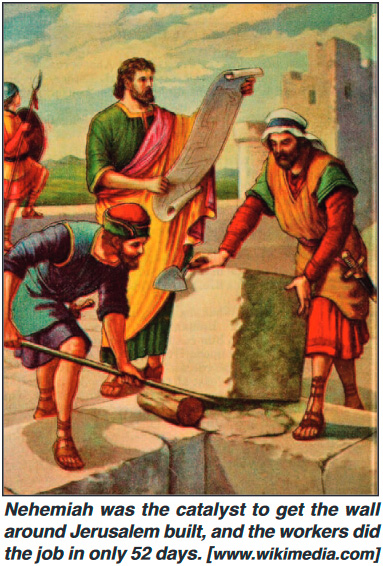 Us. We rely on our Creator for protection, to hold at bay the world’s evils from assaulting us.
Us. We rely on our Creator for protection, to hold at bay the world’s evils from assaulting us.
- God is our refuge, our fortress of strength, within whose walls we live and prosper (Psalm 9:9; 14:6; 46: 1-7, 11; 48:3; 52:1; 59:16; 62:7-8; 71:7; 91:2, 9; 94:22; 142:4; Isaiah 60:18; Ezekiel 42:20; Revelation 21:12-21).
- God is our hedge around us (Job 1:10; Isaiah 5:5).
- God is a shield against evil surrounding us (Deuteronomy 33:29; II Samuel 22:3, 36; Psalm 3:3; 5:12; 28:7; 33:20; 59:11; 84:9, 11; 91:4; 115:9-11; 119:114; 144:2; Proverbs 30:5).
Satan might want to “sift us as wheat,” like he wanted to treat Peter. Notice that Jesus said, “But I have prayed for you, that your faith should not fail; and when you have returned to Me, strengthen your brethren” (Luke 22:31-32). Likewise, our Elder Brother intercedes for us continually while Satan brings accusations against us (Revelation 12:10; Romans 8:26-27).
- Our heavenly Father has ordered us to build our temple.
Ezra 1:1-4; 6:1-12. Cyrus king of Persia first ordered the building of the temple in Jerusalem by a decree, which allowed the Judahites and Benjamites to return to their homeland, along with the articles of silver and gold that had been taken from the temple 70 years before. The people of the land railed vehemently against this rebuilding, and even where able to convince King Artaxerxes to send a decree that the building cease. However, years later a request was made of King Darius to search for the decree to build the temple, and the king found this decree given years before by King Cyrus, and ordered the building to resume. Thus, by 516 B.C. the temple was completed.
Us. Our heavenly Father, the Ancient of Days, likewise has ordered the building of our temple — the abode in which our Father and Christ dwell. We have been predestined to be called from before the earth’s creation (Ephesians 1:4-5):
“… Just as He chose us in Him before the foundation of the world, that we should be holy and without blame before Him in love, having predestined us to adoption as sons by Jesus Christ to Himself, according to the good pleasure of His will …” (see also Romans 8:30).
The Father draws those who are predestined for salvation to Jesus (John 6:44), and from that point He leads them as a Shepherd.
“But he who enters by the door is the shepherd of the sheep. To him the doorkeeper opens, and the sheep hear his voice, and he calls his own sheep by name and leads them out. And when he brings out his own sheep, he goes before them; and the sheep follow him, for they know his voice …. I am the door. If anyone enters by Me, he will be saved, and will go in and out and find pasture” (John 10:2-4, 9).
Jesus made clear that He is “… the way, the truth, and the life. No one comes to the Father except through Me” (John 14:6). There is no salvation except through Him (Acts 4:12). That calling is outlined well in Hebrews 6:1-2 as being (1) repentance from dead works, (2) faith towards God, (3) baptism, and (4) the laying on of hands to receive the gift of the holy spirit (Acts 2:38).
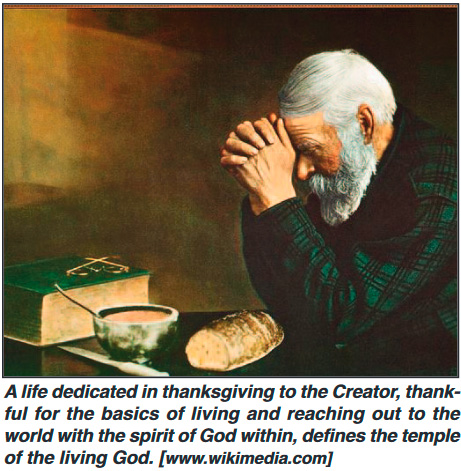 The building of God’s temple in us is a costly venture, consuming every fiber of our being. It involves the following:
The building of God’s temple in us is a costly venture, consuming every fiber of our being. It involves the following:
- Serving your Creator by keeping God’s laws in their spiritual intent, as Jesus Christ lived them perfectly, without sin … for sin is the breaking of His laws (I John 2:6; 3:4; Hebrews 4:15; I Peter 2:21; Matthew 5:17-19)
- Praying continually (Acts 12:5; I Thessalonians 5:17; James 5:16)
- Meditating upon His ways (Joshua 1:8; Psalm 1:2; 63:6; 77:12; 119:15, 23, 48, 78, 148; 143:5: I Timothy 4:15)
- Studying the words of God regularly, and applying them to your personal life (II Timothy 2:15; Acts 17:10-11; James 1:22-25)
- Fellowshipping with like-minded brethren for encouragement and education to endure to the end (I Thessalonians 4:18; 5:11; I Corinthians 14; Matthew 24:13)
- Learning to exercise the spiritual gifts given through God’s spirit, especially the attributes surrounding love (I Corinthians 12 and 13; Galatians 5:22-23; I Peter 4:10; Romans 2:13; 12:6-10; Matthew 22:36-40)
- Resisting the devil and evil, and exposing Satan’s works, while putting on God’s armor (James 4:7-8; I Peter 5:8-9; Ephesians 4:27; 6:11-17)
What Ezra and Nehemiah Teach Us
We have embarked on a journey of discovery, within the books of Ezra and Nehemiah, of how the rebuilding of the temple and walls of Jerusalem applies to us, the modern-day elect. The return of the Judahites and Benjamites to Judea after 70 years of exile in Babylon gives some powerful metaphorical understandings of how we are to build our own temples … the fleshly vessels made in God’s very image in which He dwells. Let us review this powerful reality in I Corinthians 3:16-17:
“Do you not know that you are the temple of God and that the spirit of God dwells in you? If anyone defiles the temple of God, God will destroy him. For the temple of God is holy, which temple you are” (see also I Corinthians 6:19 and II Corinthians 6:16).
This temple (naos) is “a shrine or sanctuary,” and in the case of the Israelite Tabernacle in the Wilderness and Soloman’s temple only the Levitical priesthood could enter the Holy Place … and only the high priest could enter the Holy of Holies, once a year (Exodus 30:10; Hebrews 9:1-8). In the same way, metaphorically we reside in that Holy of Holies where God dwells, the commandments written in our hearts along with the bread of life: the character of God and the spirit’s sustaining power. These commandments were written on tablets of stone given to Moses on Mt. Sinai. The manna was contained in a golden vessel, the miraculous manna given to sustain Israel’s life in the wilderness, both contained in the Ark of the Covenant within the Holy of Holies where Yahweh dwelled … and where we dwell.
The metaphorical lessons of Ezra and Nehemiah teach us to help each other build our temples through fellowship, encouragement, and love. We must be on guard to resist the efforts of Satan in distracting or derailing us from our illustrious task of temple building. While building this temple we must carefully obey the laws — in the spirit — of our Creator, and be willing to go in our walk in life wherever He sends us. We must be partial to stay within the ranks of believers, and rely on the protective wall that is built around us. Finally, we must actively build the temple of God within us using the tools He has given us to overcome the temptations of the world, and endure to the end.
By practicing these lessons from the return of the Israelites to Babylon, we can indeed be overcomers in our quest for eternal life, and at the end of days find ourselves sitting at the right hand of the Father forever!

